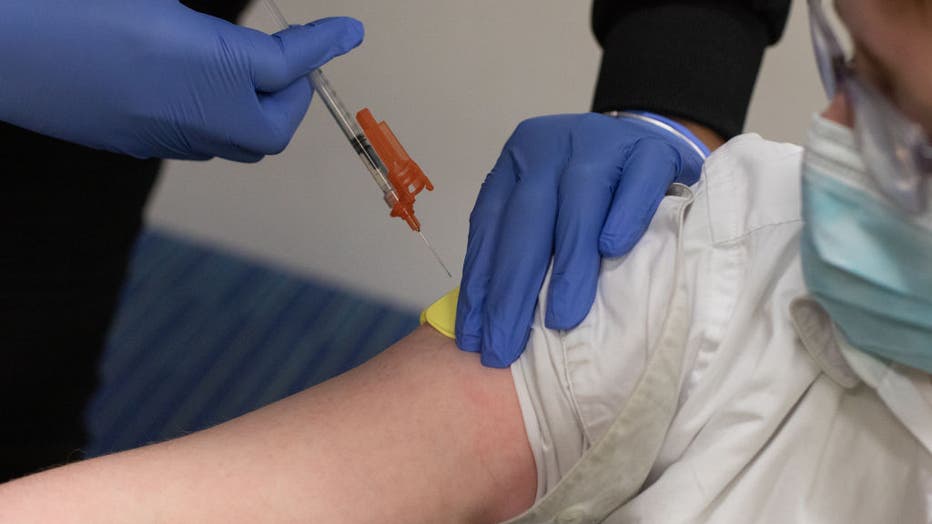CDC approves Pfizer’s COVID-19 vaccine for kids 5 to 11
WASHINGTON - The U.S. Center for Disease Control and Prevention has given the green light for children between 5 and 11 years old to receive the Pfizer-BioNTech COVID-19 vaccine, embarking the U.S. on a major and long-awaited expansion of vaccinations.
Dr. Rochelle Walensky gave final approval Tuesday evening after an advisory panel just hours earlier unanimously recommended kids aged 5-11 should get the shot.
President Joe Biden also issued a statement after the approval.
"Over the last several weeks, my Administration has been working hard to be prepared for this moment: we are ready to act," he said. "We have already secured enough vaccine supply for every child in America, and over the past weekend, we began the process of packing and shipping out millions of pediatric vaccine doses. These doses — specially designed for these younger children — have started to arrive at thousands of locations across the country."
"A vaccine for children age 5 to 11 will allow us to build on the extraordinary progress we’ve made over the last nine months," he continued.
By vaccinating children, the U.S. hopes to head off another coronavirus wave during the cold-weather months when people spend more time indoors and respiratory illnesses can spread more easily. Cases have been declining for weeks, but the virus has repeatedly shown its ability to stage a comeback and more easily transmissible mutations are a persistent threat.
The Food and Drug Administration last week paved the way for children ages 5 to 11 to get Pfizer’s COVID-19 vaccine. The FDA cleared kid-size doses — just a third of the amount given to teens and adults — for emergency use, and up to 28 million more American children could be eligible for vaccinations as early as next week.
RELATED: FDA authorizes Pfizer COVID-19 vaccine for children ages 5 to 11
"Today is a monumental day in the course of this pandemic," Walensky told the advisory panel Tuesday.
She added that while the risk of severe disease and death is lower in young children than adults, it is real — and that COVID-19 has had a profound social, mental health and educational impact on young people, including widening disparities in learning.
"There are children in the second grade who have never experienced a normal school year," Walensky said. "Pediatric vaccination has the power to help us change all of that."
The children’s vaccination drive is expected to start later this week and go into full swing by next week. Parents will be able to go to vaccines.gov and filter on vaccines for children 5-11 to find a location near them that is offering the shot.
While children are at lower risk of severe illness or death from COVID-19 than older people, 5- to 11-year-olds still have been seriously affected -- including over 8,300 hospitalizations, about a third requiring intensive care. The FDA said 146 deaths have been reported in that age group.
And with the extra-contagious delta variant circulating, the government has counted more than 2,000 coronavirus-related school closings just since the start of the school year, affecting more than a million children.
On Monday, the Biden administration said it’s assembling and shipping millions of COVID-19 shots for children in this age group.
"We are not waiting on the operations and logistics," said coronavirus coordinator Jeff Zients.
Nearly 70% of 5- to 11-year-olds hospitalized for COVID-19 in the U.S. have other serious medical conditions, including asthma and obesity, according to federal tracking. Additionally, more than two-thirds of youngsters hospitalized are Black or Hispanic, mirroring long-standing disparities in the disease’s impact.
RELATED: FDA delays decision on Moderna COVID-19 vaccine for kids 12-17
A Pfizer study of 2,268 schoolchildren recently released found that the vaccine was nearly 91% effective at preventing symptomatic COVID-19 infections, based on 16 cases of COVID-19 among kids given dummy shots compared to just three who got vaccinated.
RELATED: Pfizer says COVID-19 vaccine more than 90% effective in kids 5-11
The FDA ultimately assessed more children — 3,100 — who received the kid dosage to conclude it was safe. Youngsters experienced similar or fewer temporary reactions, such as sore arms, fever or achiness, that teens experience.
The study wasn’t large enough to detect any extremely rare side effects, such as the heart inflammation that occasionally occurs after the second full-strength dose, mostly in young men and teen boys. It’s unclear if younger children getting a smaller dose also will face that rare risk. FDA pledged last week to keep a close watch.

FILE - A healthcare worker administers a dose of a Pfizer-BioNTech Covid-19 vaccine to a child at a pediatrician's office in Bingham Farms, Michigan, on May 19, 2021. Photographer: Emily Elconin/Bloomberg via Getty Images
Meanwhile, some parents are expected to vaccinate their children ahead of family holiday gatherings and the winter cold season.
But a recent Kaiser Family Foundation survey suggests most parents won’t rush to get the shots. About 25% of parents polled earlier this month said they would get their children vaccinated "right away." But the remaining majority of parents were roughly split between those who said they will wait to see how the vaccine performs and those who said they "definitely" won’t have their children vaccinated.
The similarly made Moderna vaccine also is being studied in young children, and both Pfizer and Moderna also are testing shots for babies and preschoolers. A decision on the authorization of Moderna’s COVID-19 vaccine for kids ages 12 to 17 was delayed while U.S. regulators continue to study the rare risk of heart inflammation, the company said Sunday.
The Associated Press contributed to this report. This story was reported from Los Angeles.



